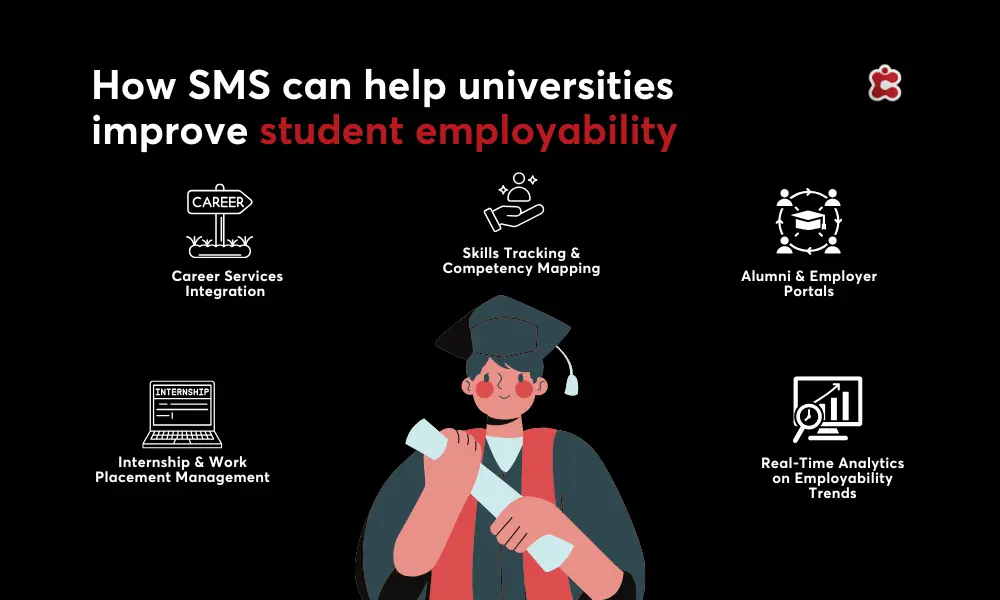Graduating from an Irish university is a big achievement, but let’s be real—landing a job after college isn’t always easy. Employers aren’t just looking for degrees; they want practical skills, industry experience, and job-ready graduates. In Ireland, booming sectors like tech, healthcare, and finance are full of opportunities, yet many students struggle to bridge the gap between classroom learning and real-world expectations.
Irish universities have a responsibility to bridge this gap by offering career-focused education, building strong employer partnerships, and providing hands-on learning opportunities. However, managing internships, tracking skill development, and delivering personalised career support across thousands of students is no easy task.
In this article, we’ll dive into how Irish universities can better prepare students for the workforce and how School Management Software (SMS) can make the entire process smarter, smoother, and more effective.

The Challenges Universities Face in Preparing Students for the Workforce
Irish universities are committed to helping students succeed, but preparing them for the workforce comes with real challenges. Employers today expect graduates to have practical, job-ready skills, not just academic knowledge. Yet, many students leave college without hands-on experience, making it harder for them to land their first job.
One major issue is the lack of structured career guidance and internship programs. Career services often struggle to provide personalised support, leaving students unsure of how to navigate job applications, interviews, and industry expectations. Internships, which are key to building experience, can be difficult to coordinate at scale. Without a streamlined system, matching students with relevant opportunities and tracking their progress becomes a logistical nightmare.
Another challenge is tracking student employability outcomes. Universities need to know if their graduates are securing jobs in their fields, but gathering this data manually is time-consuming and inefficient. Without clear insights, institutions can’t adjust their programs to better align with employer needs.
Enhancing Career Readiness with Digital Tools
Technology is transforming how Irish universities prepare students for the workforce. Digital tools help career services, students, and employers stay connected, making the transition from university to employment smoother. Here’s how School Management Software can enhance career readiness:
- Internship & Work Placement Management – Universities can easily track student applications, employer feedback, and placement progress in one system. This ensures that students are matched with the right opportunities and receive structured workplace experience.
- Career Services Integration – SMS connects students with job postings, career advisors, and resume-building tools. Universities can provide personalised career guidance, helping students refine their CVs and prepare for interviews.
- Skills Tracking & Competency Mapping – Students can monitor their strengths, identify skill gaps, and work on areas that need improvement. Universities can align learning outcomes with industry needs, ensuring that graduates have the right competencies.
- Alumni & Employer Portals – Universities can build stronger professional networks, linking students with alumni and employers for job opportunities, mentorship, and industry insights.
- Automated Progress Reports & Analytics – Career services can track student employability trends and measure programme effectiveness. Data-driven insights help universities refine their strategies and ensure students are workforce-ready.
Strengthening Internships and Work Placement Programmes
There’s no substitute for hands-on experience. Internships and work placements give students the chance to apply their skills in real-world settings, build professional networks, and gain a better understanding of their chosen industry. Employers in Ireland increasingly look for graduates with practical experience, making these programmes essential for boosting employability.
However, managing internships at scale is a challenge. Universities must match students with the right opportunities, coordinate placements across multiple industries, and track student progress. Without a structured system, students can struggle to find placements, employers may not receive the right candidates, and universities may miss out on valuable data about graduate readiness.
This is where School Management Software makes a real difference. With the right system, universities can automate internship matching, track placement progress, and collect employer feedback in one centralised platform. Students can easily search for opportunities, submit applications, and receive updates, while employers can provide structured evaluations. Career services can monitor each step, ensuring students get the best possible experience.
Using Data to Improve Student Employability
Irish universities have access to a wealth of student data, but are they using it effectively to improve career outcomes? By analysing student performance, universities can identify career-readiness gaps, personalise support, and track graduate success.
With student performance analytics, universities can see which students are excelling and who may need extra guidance. Data on coursework, skills development, and internship performance helps career services tailor support, recommend training, and connect students with relevant opportunities. This ensures no student falls behind in their employability journey.
Tracking graduate employment rates is just as important. Universities need to know where their graduates end up, what industries they thrive in, and how long it takes them to secure jobs. School Management Software (SMS) makes this process seamless by collecting employment data, tracking job placement trends, and providing real-time insights.
Classter’s SMS: Built for Irish Universities
Preparing students for the workforce is no small task, but Classter’s School Management Software makes it easier for Irish universities to bridge the gap between education and employment. With tools designed to streamline career services, track student progress, and connect graduates with employers, Classter helps universities future-proof their students.
Career services integration connects students with job opportunities, career advisors, and CV-building tools, ensuring they’re well-prepared for life after university. Skills tracking and competency mapping help students identify areas for improvement and align their learning with industry demands.
Classter’s alumni and employer portals create strong professional networks, making it easier for graduates to land jobs while keeping universities connected to the industries they serve. Plus, with automated analytics and employability tracking, universities can measure graduate success and refine their programmes accordingly.
Ready to transform student employability at your university? Discover how Classter can help you equip students with the skills, experience, and connections they need to thrive.
FAQ’s
School management software streamlines career services by managing internships, tracking skill development, and connecting students with job opportunities. It provides data-driven insights, ensuring students graduate with job-ready skills aligned with industry needs.
It facilitates employer portals where businesses can post job opportunities, evaluate student performance, and engage with universities to ensure that graduates meet workforce expectations.
Yes, Classter integrates with external career platforms, HR tools, and job boards, making it easy for universities to enhance their existing systems without disruptions.

